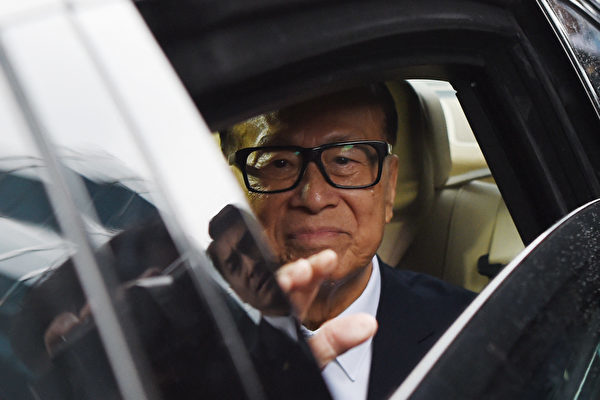On May 10, 2018, Hong Kong tycoon Li Ka-shing officially retired after presiding over a shareholders' meeting. (Anthony Wallace/AFP)
[People News] Recently, major public opinion incidents have erupted across Chinese society, ranging from lead poisoning of children in Tianshui, people in Hangzhou drinking sewage, the deaths of six students at Northeastern University, to the latest hot-button scandal involving the "ID-checking sister." The public’s disgust with the Chinese Communist Party’s (CCP) incompetence, rampant corruption, and unchecked privilege has reached intolerable levels. Coupled with a deteriorating economy, widespread business closures, skyrocketing unemployment, and mounting social tensions, the country is now a powder keg awaiting a spark. With high-level factional struggles and growing regime instability, signs of the CCP’s dynasty nearing collapse are increasingly evident.
State-Affiliated Professor Hints at CCP's Imminent Collapse
A controversial and widely circulated online speech by Zhai Dongsheng, a state-affiliated economist from Renmin University of China in Beijing, openly acknowledged China’s deepening social unrest. He noted that young people and the middle class are becoming the most destabilised social groups, and advised the CCP to hand out money directly to them in order to maintain stability and "extend the life of the Party."
Zhai stated that historically, it's not the poorest who topple dynasties—they’re too exhausted and powerless to resist. Instead, regime collapse happens when those who once expected to be part of the elite class are pushed down to the bottom. These groups have the capability and motivation to revolt. He cited historical examples of successful uprisings led by disenfranchised scholars, prosperous merchants, and fallen aristocrats—those with resources and aspirations who suddenly lose their status.
Zhai then pivoted to the present: China's social foundation, he argued, relies on its college-educated population—a group that now exceeds 10 million new graduates annually. He pointed to government actions that wiped out industries like private tutoring and tech—policies which resulted in millions losing jobs or having to change careers. Zhai said he speaks out because he doesn’t want to see the regime collapse.
Zhai's commentary is striking. Drawing parallels between past and present, he implies that China is now in a period of societal instability akin to dynastic collapse, because of the impoverishment of the middle class and loss of employment among the elite. He specifically referenced “successful businessmen” and “fallen aristocrats”,—which many interpret as a jab at Xi Jinping’s crackdown on private entrepreneurs like Jack Ma, and the sidelining of red aristocrats such as Liu Yuan, Liu Yazhou, and Wang Qishan—all with strong revolutionary pedigrees, now ousted under Xi's leadership.
He also highlighted the plight of college graduates, whose job prospects have been destroyed by Xi’s policies. With industries like education and tech wiped out, these "proto-elites" have been denied upward mobility, triggering unrest.
Zhai Suggests the CCP Should Distribute Cash to Stay in Power
Zhai warned that rising populist sentiment in China is spiralling out of control, and that policymaking has become disjointed—each government department thinks it’s doing the right thing, but collectively they’re causing disastrous systemic errors. To prevent collapse, he argued, the CCP must abandon empty formalities, promote "common prosperity", and most importantly—give people money.
He claimed populism thrives for two reasons: 1. The disruption of information flow, where people now consume self-media instead of state media, creating echo chambers. 2. More importantly, growing wealth inequality. Zhai asserted that the post-50s to 70s generations have exploited younger people through skyrocketing housing prices and inflation, leading to three classic triggers of social instability: High inflation, High unemployment, and Widespread higher education.
Zhai proposed that to achieve common prosperity and maintain stability, the government must start handing out money from birth. He suggested monthly payments of 13,000 yuan (approx. USD 1,800) from birth through university, and continuing up to age 40 if unemployed or still in education. He made it clear: No money for the middle-aged or elderly.
This speech by Zhai Dongsheng, circulated within China, was likely aimed at university students. Judging from the content, it doesn’t appear to be recent—it is estimated to have been delivered in 2022, the year when the number of university graduates in China first surpassed 10 million, reaching 10.76 million. That was also the critical period when Xi Jinping began accelerating his regression, cracking down on the internet sector, suppressing private enterprises, and wrecking the real estate market—leaving the Chinese economy in complete shambles.
Zhai Indirectly Criticises Xi’s Policy Missteps, Reflecting Internal Power Struggles
So why is this old speech being revived online now? There could be several reasons:
First, China’s social unrest is worse than imagined. The collapsing economy, collapsing livelihoods, and civil servants' unchecked abuse of power—such as in the Guangxi “ID-checking sister” case—have sparked public fury. The CCP’s credibility has plummeted, and the regime seems dangerously unstable. Zhai’s speech appears to align with public sentiment, though in reality it aims to shore up CCP legitimacy, advocating ways to prevent its downfall.
Second, Zhai’s speech contains implicit criticism of Xi Jinping’s policies—especially his disastrous economic decisions. As a regime-approved academic, Zhai would not speak so boldly unless there was an internal shift in political winds. The resurfacing of this speech suggests growing power struggles, particularly as senior CCP figures gather for the annual Beidaihe retreat—a venue for behind-the-scenes elite infighting. Zhai and others like him are politically attuned enough to sense when Xi’s grip is weakening.
Netizens: “Forget money—give us guns”
Still, will the CCP actually adopt Zhai’s proposal to hand out cash? Most netizens are sceptical, dismissing it as empty promises or fantasy economics: “The money’s all in the homes of CCP leaders—he thinks they’ll give it up?” “The biggest problem in society is unchecked power.” “Even civil servants can’t afford to eat—how will they give money to the masses?” “Two-thirds of the cash would go to officials’ benefits—you think they’d allow this?” “According to his plan, that’s 14 ÷ 3 × 1.3 × 12 = 72.8 trillion yuan annually. That’s pure fantasy!”
Many see Zhai’s rhetoric as typical of elite intellectuals playing populist games—promising the moon without confronting the system. Meanwhile, Hong Kong tycoon Li Ka-shing is making headlines for trying to sell his Deep Water Bay mansion for HKD 5 billion. Built in 1957 and purchased in 1963 as a wedding home, it’s long been his private residence and business hub.
Speaking of returning to one’s roots, why did Li Ka-shing sell even his own longtime residence? Because he’s come to realise that the Chinese Communist Party simply doesn’t honour trust or follow rules. Rumor has it that Li made two pointed remarks: 1. “From now on, Hong Kong is yours.” 2. “Of all the people who ever set their sights on my money, Cheung Tze-keung was the most trustworthy.” The first line clearly signals a deliberate break with the CCP—Li is willing to sell his old home and flee Hong Kong. The second line is a stinging jab, implying that the CCP is even less trustworthy than a kidnapper. For context: In 1996, gangster Cheung Tze-keung kidnapped Li Ka-shing’s eldest son, Victor Li, and demanded HK$1.038 billion in ransom. Li paid the sum, and Cheung kept his word—Victor was released unharmed.
Zhai Dongsheng’s speech ended with the claim that “the Communist Party must put the people first and protect them.” One netizen quipped: “If they really cared about the people, the CCP wouldn’t just hand out cash. They’d hand out guns.”
(First published by People News) △











News magazine bootstrap themes!
I like this themes, fast loading and look profesional
Thank you Carlos!
You're welcome!
Please support me with give positive rating!
Yes Sure!